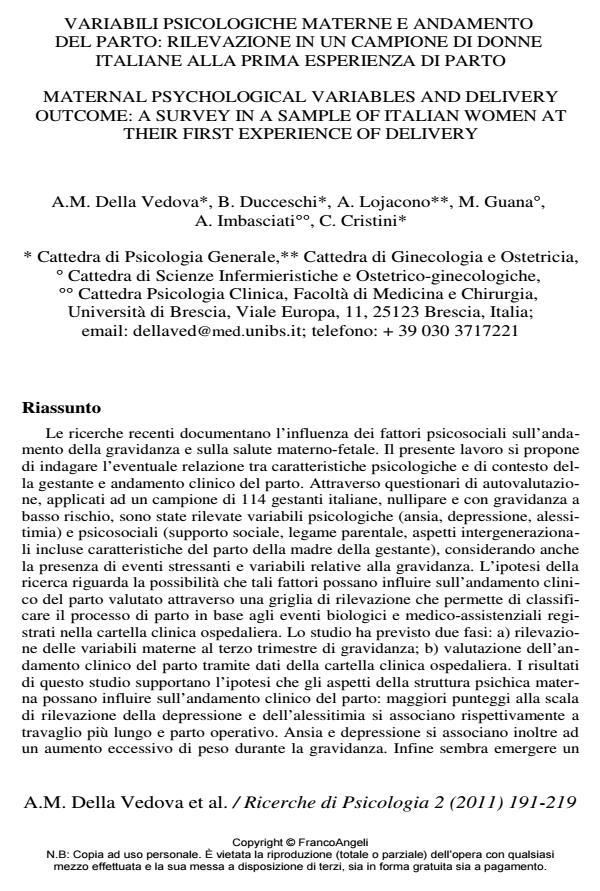Maternal psychological variables and delivery outcome: a survey in a sample of italian women at their first experience of delivery
Journal title RICERCHE DI PSICOLOGIA
Author/s Vedova A .M. Della, B. Ducceschi, A. Lojacono, M. Guana, A. Imbasciati, C. Cristini
Publishing Year 2012 Issue 2011/2
Language Italian Pages 29 P. 191-219 File size 197 KB
DOI 10.3280/RIP2011-002003
DOI is like a bar code for intellectual property: to have more infomation
click here
Below, you can see the article first page
If you want to buy this article in PDF format, you can do it, following the instructions to buy download credits

FrancoAngeli is member of Publishers International Linking Association, Inc (PILA), a not-for-profit association which run the CrossRef service enabling links to and from online scholarly content.
Recent research highlights the influence of psychosocial factors concerning the pregnancy outcome and the maternal-foetal well being. The aim of the study is to investigate the possible relationship between the psychological and contextual characteristics of the woman and the clinical process of labour and delivery. A series of questionnaires were administered to a sample of 114 nulliparous, and low risk pregnant Italian women in order to evaluate the pregnant woman‘s psychological (depression, anxiety, alexithymia) and psychosocial variables (social support, parental bonding, intergenerational aspects including the characteristics of the delivery process of the pregnant woman’s mother) also considering the presence of stressful events and pregnancy related variables. The study hypothesis relates to the potential influence of these factors on the clinical process of the birth evaluated by means of an instrument which permits the classification of the process of labour and delivery based on the biological events and medical interventions recorded in the hospital medical file. The study involved two phases: a) the survey of the maternal variables in the third trimester of pregnancy; b) the evaluation of the delivery outcome according to the hospital medical file. The results of the study support the hypothesis that psychological maternal variables may influence the clinical process of delivery and labour: higher scores of depression and alexithymia were associated with a longer labour and delivery complications respectively. Anxiety and depression also resulted associated to an excessive weight gain during pregnancy. Moreover what seems to emerge is the role of the intergenerational aspects: the presence of delivery complications was associated to delivery complications of the pregnant woman’s mother. The results must be considered carefully considering the reduced size of the sample and the complexity of the variables. However this study suggests the necessity of reflection with regards to the psychosomatic nature of delivery and labour also underlining the relevance of psychosocial variables in perinatal care.
Keywords: Pregnancy, labour, delivery, psychosocial factors, anxiety, depression, alexithymia.
- Carlo Cristini: un ricordo a pi&ugrav Alessandro Antonietti, Carlo Cipolli, Rossana De Beni, Anna Maria Della Vedova, Santo Di Nuovo, Mario Fulcheri, Gianbattista Guerrini, Luciano Peirone, Alessandro Porro, Pietro Vigorelli, in RICERCHE DI PSICOLOGIA 4/2022 pp.1
DOI: 10.3280/rip2021oa13098
Vedova A .M. Della, B. Ducceschi, A. Lojacono, M. Guana, A. Imbasciati, C. Cristini, Variabili psicologiche materne e andamento del parto: rilevazione in un campione di donne italiane alla prima esperienza di parto in "RICERCHE DI PSICOLOGIA " 2/2011, pp 191-219, DOI: 10.3280/RIP2011-002003